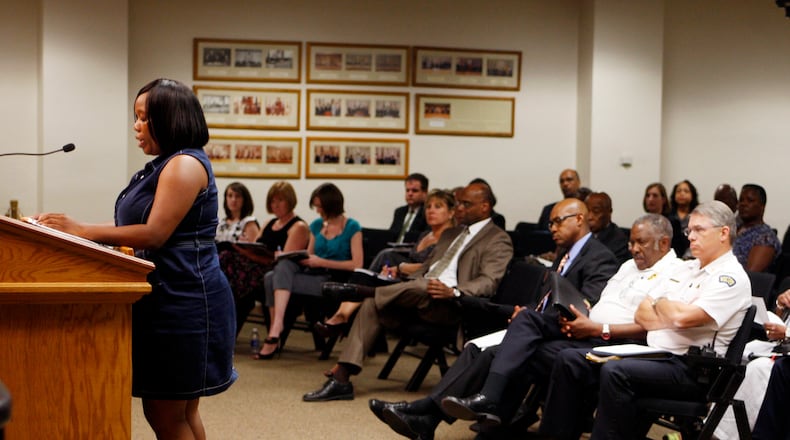RELATED: Coronavirus Complete Coverage
“We made the determination to close public meetings in order to comply with current guidelines from the Ohio Department of Health, and we believe it is in the best interest of the public to ensure appropriate social distancing,” said Montgomery County Commission President Judy Dodge. “The County is still operating and ensuring that critical services are provided to our constituents.”
Meetings will be livestreamed on Facebook and also available on DATV.
Commissioners meet on Tuesdays at 9:30 a.m. and 1:30 p.m.
Dayton city commissioners will vote this week on an ordinance allowing the public to be barred from meetings and allowing city leaders to teleconference in. Huber Heights passed a similar measure and is holding its first such meeting tonight.
No public access will be provided to a Dayton Public Schools meeting scheduled for Tuesday, March 17. The meeting will be broadcast on the district's cable access station and live-streamed on its Facebook page.
“We have to do our part to ensure that we’re protecting the public and limiting access,” said school board President Mohamed Al-Hamdani. “Our meetings sometimes can be really crowded. We can have 100 people in one room, and obviously with the abundance of caution everyone is taking, we want to make sure we’re taking the extra steps … to protect the public.”
RELATED: Coronavirus concern: Montgomery County Juvenile Court postpones most cases until May
Al-Hamdani said people who want to provide public comment to the board can email them to DPSSupt@daytonpublic.com. Public comments will be read aloud during the meeting, he said, and questions will be answered later on the district’s Facebook page.
Items on Tuesday’s agenda include authorizing the school treasurer to borrow up to $30 million for building and facilities improvements over the next three years. Al-Hamdani said they will need to consider whether to table items until things return to normal, but “we still have to be prepared for next school year.”
Ohio Attorney General Dave Yost issued guidance last week saying that during the governor’s declared coronavirus emergency, governments can meet the state law’s requirement that meetings be “open” to the public by live-streaming through the internet or television. Yost’s guidance also said elected officials could attend meetings remotely by teleconferencing, though that conflicts with state law according to the Sunshine Law manual released by his office earlier last week.
RELATED: Coronavirus testing, collection site planned for UD Arena parking lot
Dayton city commissioners this week are expected to vote on new legislation that will allow them to hold meetings remotely during the coronavirus emergency.
The legislation would allow city commissioners to use electronic methods, like video teleconferencing, to hold special, regular or emergency meetings when a emergency declaration is pending.
Commissioners would not be required to be physically present at the meeting site, and meetings do not need to be open to the public or allow public comment.
Meetings are expected to be broadcast online and on TV or cable.
Dayton’s proposed legislation is in line with Yost’s guidance, said John Musto, Dayton’s chief trial counsel.
Normally, anyone can attend city commission meetings, which means crowds are possible at a time when people are supposed to avoid large gatherings and engage in social distancing, Musto said.
“We don’t want citizens to be exposed,” he said.
“It’s such a fluid situation,” he said. “I know that we’re constantly monitoring and seeing what we can do based on the changing circumstances on the ground to allow continuance of government and maximize safety of the citizens.”
Coronavirus: Here’s how workers can apply for unemployment benefits
Huber Heights City Manager Rob Schommer said the city will stream meetings on the city's website and is working on ways to make it more interactive. Residents can submit comments before meetings by email at publicmeeting@hhoh.org or by calling (937) 237-5812.
Comments must be registered prior to 5 p.m. on the day of the meeting. Comments will be read aloud during the meeting, Schommer said.
The only people in the council chambers will be the mayor, city manager and minimal staff to help run the technology, he said.
The legal basis behind parts of Yost’s guidance is questionable, according to Jack Greiner, a Cincinnati attorney who specializes in media and public records law.
Greiner said it’s important that governments continue to find ways to include the public in decision making during these “truly unprecedented times.”
“I hope public offices that… follow Attorney General Yost’s guidance recognize this is a temporary thing and we would no more continue to ban the public than we would continue to insist that restaurants stay closed,” he said.
Yost’s own guidance cautioned governments to get a legal opinion from their own attorneys and avoid making any big, unnecessary decisions at this time.
“Now is not the time to rely on this guidance in order to enact legislation unrelated to the instant emergency that is better reserved for the normal operations of government (e.g. to pass a new tax or enact a new regulatory scheme),” Yost’s letter says


